Boulder Neurofeedback: Perform at Your Best
Discover the benefits of neurofeedback in Boulder, CO. Visit our blog to learn more about our personalized brain training programs.
Learn the best ways for brain training for mental focus, emotional resilience and to manage stress and fear. Some are also free evidence-based strategies.
Brain training is all about unlocking your potential through helping the brain function at its best. A healthy brain demonstrates the ability to face adversity and to find resiliency when there are mental or emotional set-backs.
There are many aspects of our health that are positively impacted through various kinds of targeted training. Most people commonly associate brain training with cognitive abilities: improved focus, memory, word recall and executive functioning, but brain training also encompasses managing stress better, emotional regulation, and sleep training.
Brain training tools addressed here include: how to train your brain to manage fear and stress better. We'll look at the evidenced-based proven tool of gratitude training, cognitive tools for conquering fear, and meditation practices for emotional resiliency.
Brain training for better sleep includes a sleep routine that is effective. As well we'll look at neuro-biofeedback, or neurofeedback for increasing mental focus in children and in individuals with post-cancer treatment chemo brain.
First stop in learning about the best brain training is understanding a bit about the history of the field of studying the brain, or neuroscience. Arguably, it is both the most important organ in our bodies, and also the most complex. For centuries, the brain remained a mystery or there was more misinformation than accurate information about how it worked.
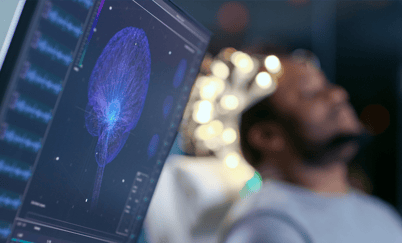
It was only in the 1950s that brain physiology and psychiatry joined together as a unified field of study. The great leaps in understanding have corresponded with leaps in technology such as the microscope in the late 1890s and the MRI and other brain imaging in the late 1970s. It is only now in the past 30 years, with the help of technological advancements, that we are beginning to grasp the intricacies of the physical brain and how it functions.
One of the most important scientific discoveries about the brain has been that the brain is not a fixed system, but rather, it is malleable and can change. This principle is called neuroplasticity. Neuroplasticity is the principle that the brain is capable of changing its neural circuitry and creating new neural pathways.
Into the 1990s, though the term had been coined in 1948, there was a belief that the brain could not more functioning to another area of the brain if there was damage. A stroke assumed permanent loss to whatever functions were impacted by the loss of blood flow. In this early understanding there was no need for a concept like brain training to rehabilitate, a common idea today.
There is still much we don't know about how to keep the brain functioning at its best, but luckily we now have scientifically-backed information that helps us improve our mental and emotional health, and lead more fulfilling lives. Brain training strategies are employed by more and more people and professionals, and are using to help with a wide variety of issues from rehabilitation after a stoke or concussion, for cognitive performance and mental acuity, for combatting stress and for stabilizing and improving mood.
Brain training, being a wide-ranging group of activities can cost you nothing, a few dollars, or hundreds of dollars per training session. In this article we will mostly discuss free brain training tools. With many of the tools described below, such as gratitude practice or mindfulness meditation, the cost is free to access the tools, but they require your time and consistent effort.
In general with brain training, you get out what you put in. Like learning a language, the main cost is your time and a consistent effort. With both, you reap the rewards of performing at your best.

Here are two educational resources on how brain training can effectively help mood, specifically fear and anxiety. Fear is part of the emotional alarm system meant to signal us to imminent danger. The limbic brain, our 'reptilian' brain, takes over and uses the stress response strategies for securing safety: punch it, run from it, or play dead. More commonly known as the fight/flight response. Fear is our savior when there is immediate, less than a minute danger upon us, but then it becomes our prison, when it gets generalized into a habitual reaction to all things problematic but not life threatening.
We all have to learn to work with this fear or stress response. Here are two resources for working with fear. The first is using gratitude practice to counteract the fear-based limbic brain and the second is a podcast interview with a neurosurgeon on how he overcomes his fear.
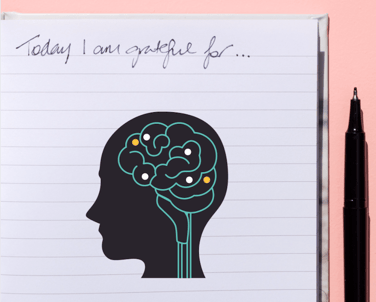 Journalist Hazel Harrison explains that when fear takes charge of our brains we tend to focus all our attention on risks and worst-case scenarios. Her article on how to decrease fear focuses on the practice of gratitude, a mindfulness practice, that has shown in many studies to be effective.
Journalist Hazel Harrison explains that when fear takes charge of our brains we tend to focus all our attention on risks and worst-case scenarios. Her article on how to decrease fear focuses on the practice of gratitude, a mindfulness practice, that has shown in many studies to be effective.
Gratitude practice has been gaining attention in the area of positive psychology. Thus far studies on the impact of gratitude have shown it to help not just with decreasing fear and boosting positive emotions but on other areas of health as well. It's shown to correlate with better immune system functioning and taking better care of ones health to name a few.
A neurosurgeon, who's job is to move a scalpel with millimeter precision would be motivated to learn how to decrease fear in the present moment. Dr. Mark McLaughlin wrote, Cognitive Dominance: A Brain Surgeon's Quest to Outthink Fear, to share with others the strategies he has learned to train his brain in response to fear.
In this podcast he shares some of his strategies for getting the pre-frontal cortex back in charge, which is the rational and strategic brain, when the fear response has been triggered. He shares a compelling story of being in the middle of brain surgery when he became terrified, and what he did to regain his calm and focus.
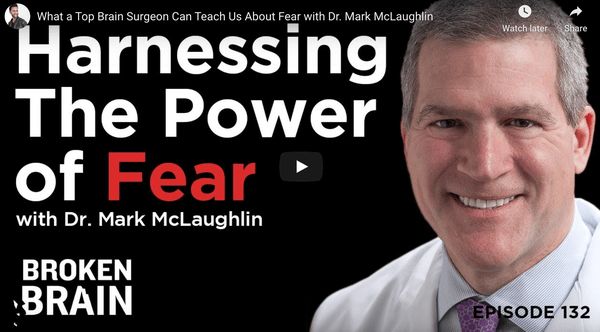
Emotional resiliency is the ability of the mind and brain to work with adversities in a healthy way. It could be thought of as our emotional 'toughness'. When things don't go our way, or when bad things happen how do we react and respond?
 Some people think that resiliency is an innate ability. "Some people are just more resilient" is a belief many people have, which is neither accurate nor helpful. Resiliency to adversity can be taught. We can train our minds and our brains to not give up or shut down, the latter being the "freeze" in the fight/flight/freeze stress response of the limbic brain.
Some people think that resiliency is an innate ability. "Some people are just more resilient" is a belief many people have, which is neither accurate nor helpful. Resiliency to adversity can be taught. We can train our minds and our brains to not give up or shut down, the latter being the "freeze" in the fight/flight/freeze stress response of the limbic brain.
Journalist, Kira Newman, in her article "Five Science-Based Strategies to Build Resiliency" lays out many strategies for building emotional fortitude. They range from working with changing our thought patterns, the narratives we tell ourselves about what it possible, to cultivating self-compassion, and building up our ability to engage fully in the present moment through mindfulness practice.
Mindfulness meditation has been shown in studies to help build emotional resiliency by allowing people to train in staying present with their experience. It also helps with mood regulation and combating stress, in part by training in not following the stressful thoughts with our attention.
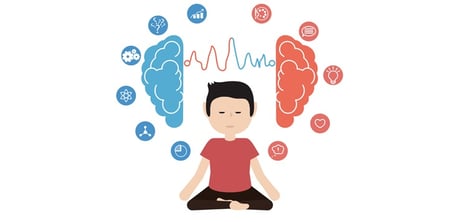 The challenge with using mindfulness meditation as a brain training technique, is that the practice has to be repeated for a period of a few weeks or months in order to see the full benefits. And the benefits are not always immediately felt. At a new restaurant or trendy health spa, if the food tastes amazing or the massage melts our aching muscles, our sensory experience gives us an accurate indication of the benefits. Meditation is a longer-term commitment, with a variety of short-term outcomes, some of which we don't like, but is very common, such as a challenging emotion arising during a session. in order to experience the stress reduction benefits.
The challenge with using mindfulness meditation as a brain training technique, is that the practice has to be repeated for a period of a few weeks or months in order to see the full benefits. And the benefits are not always immediately felt. At a new restaurant or trendy health spa, if the food tastes amazing or the massage melts our aching muscles, our sensory experience gives us an accurate indication of the benefits. Meditation is a longer-term commitment, with a variety of short-term outcomes, some of which we don't like, but is very common, such as a challenging emotion arising during a session. in order to experience the stress reduction benefits.
With awareness of expectations, and being wary of the "it-better-be-amazing" approach to meditation, individuals can gain a lot from scientifically proven way to reduce stress and improve brain health.
Meditation without Credentials; We measure ourselves and each other by a personal set of credentials: our professional accomplishments, the school we went to, our social circle, where we live. This also applies to the spiritual path. What is this running narrative about ourselves meant to prove?
The brain needs sleep more than any other organ in our bodies, yet we as a nation are chronically sleep deprived. So much so, that economists have estimated it costs us $411B every year due to illness-related missed work and poor work performance.
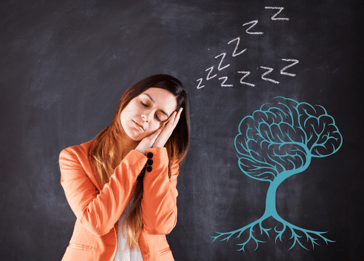
When we don't get enough sleep many areas of our health and functioning are affected. Not enough sleep affects our memories, which are consolidated when we sleep. We flush out toxic waste through our brain's lymphatic system when we sleep, our energy is recharged. Sleep deprivation affects reaction time, cognitive abilities and emotional reactivity. (You have seen children's reactions to disappointment when they didn't get enough sleep?!)
Good sleep is not a mystery formula, nor is it a thing that some people have and others don't. Sleep training is how we get our children to learn how to be good sleepers. It's also the same strategy sleep doctors recommend when patients have insomnia. The first intervention, after sleep disorders such as sleep apnea are ruled out, is behavior changes through learning good sleep hygiene practices.
The biggest reason people fail at improving their sleep: not having a long enough time horizon for change. Training ourselves to sleep well takes about three months of consistent practice. The second reason for failure is that people struggle to find evening entertainment that does not rouse the brain into a stress response or 'go-mode.' Taking time to find interesting and engaging entertainment whether its on Netflix or an audiobook, is key to success. The third reason is alcohol. It calms you initially then wakes you up in the middle of the night when the body digests the sugars.
Neurofeedback, or EEG biofeedback, is a relatively new, and the most technologically sophisticated intervention in the field of biofeedback and brain training. Neurofeedback tracks the electrical brainwaves and gives precise feedback to the brain about the brainwave patterns that may be maladaptive to the tasks at hand. For example a brain that is activated the brainwaves associated with scanning the environment for change, also called hypervigilence and impulsivity, is not what is needed when there is a work task present. For work, our slower, focusing brainwaves should be activated. These choices are not made by the consciously controlled brain, which is why techology, like neurofeedback, which is designed to train the automatic-functioning brain, is so helpful.
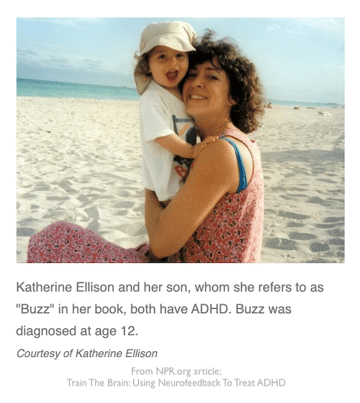 Writer Katherine Ellison, who ultimately wrote a book about brain training, shares her experiences with using neurofeedback for her son in this NPR interview. Parents see their children's ability to focus, and manage their emotions with neurofeedback therapy.
Writer Katherine Ellison, who ultimately wrote a book about brain training, shares her experiences with using neurofeedback for her son in this NPR interview. Parents see their children's ability to focus, and manage their emotions with neurofeedback therapy.
"He was getting into fights. He wasn't doing his homework. He was being very difficult with his little brother. And he was just melting down day after day," Ellison says. "So I decided to devote a year to trying out different approaches to see if we could make it any better."
She shares their journey through using this technology when mostly unheard of by the public.
Another use for neurofeedback to improve cognitive focus and performance is with post-chemotherapy people who are having issues with what's called "chemo-brain." They report decreased mental focus, word-recall being diminished, and being more easily fatigued after cognitive tasks.
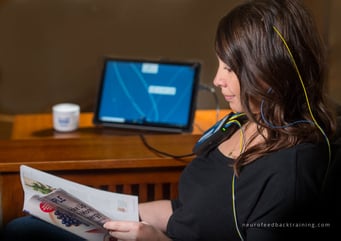 In a study published in 2013 using NeurOptimal® neurofeedback, 21 out of 23 participants reported their cognitive impairments and brain fog vastly improved after the brain training.
In a study published in 2013 using NeurOptimal® neurofeedback, 21 out of 23 participants reported their cognitive impairments and brain fog vastly improved after the brain training.
Whether we want to improve our overall brain performance, cognitive abilities or emotional wellbeing there are many effective tools for training our brains, many of which cost us nothing. The key to successful training is remembering to apply consistent effort for an appropriately long enough time to see the results.
Natalie Baker has over 25 years of experience as a licensed psychotherapist and has been a NeurOptimal® neurofeedback trainer since 2011. She is the founder of Neurofeedback Training Co., which offers in-person sessions and runs the largest nationwide home rental program for NeurOptimal systems. Natalie also teaches meditation and Buddhist psychology and specializes in working with anxiety, stress, ADHD, and trauma.
Discover the benefits of neurofeedback in Boulder, CO. Visit our blog to learn more about our personalized brain training programs.
Peak Performance for Everyone: Experience the Flow State. Achieve peak performance and experience the flow state with NeurOptimal.
Peak Performance with Neurofeedback: Achieve the Flow State. Train your brain to perform at its best with Neuroptimal.
Be the first to know about new blogs